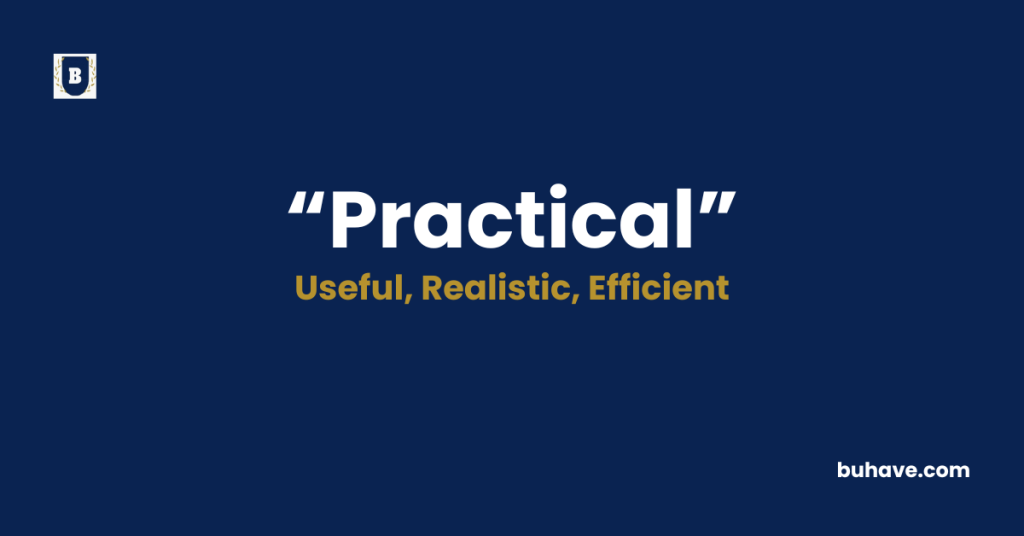The word ‘Practical’ (Adjective) describes something or someone focused on actual use, functionality, or realistic approaches—often emphasizing effectiveness, logic, and hands-on solutions. In this guide, you’ll learn the full definition, synonyms, antonyms, etymology, and real-life examples of how to use ‘Practical’ correctly in sentences.
Practical Explained in Depth
A complete and detailed guide to the word Practical including meaning, definition, examples, etymology, synonyms, and antonyms.
Meanings of Practical
The word practical refers to a quality or approach that is based on real-world use, effectiveness, or feasibility rather than on theories, ideas, or aesthetics. A practical person tends to focus on what works in a given situation and looks for the most efficient, functional, or straightforward way to accomplish goals. In daily life, people use the term “practical” to refer to tools, advice, skills, or decisions that are sensible and useful. A practical outfit might prioritize comfort and weather-appropriateness over fashion. A practical idea focuses on execution and applicability, rather than being abstract or idealistic. The word can also imply common sense and realism particularly in decision-making or problem-solving.
Being practical means knowing how to make things work in the moment, with a strong connection to lived experience, which often leads to success in real-life challenges.
Definition
Practical is defined as relating to real situations and experiences rather than ideas or theories; it refers to something functional, realistic, and oriented toward actual results or usefulness. The word is often used to describe people, tools, ideas, or methods that are designed to solve problems efficiently and effectively.
A practical approach favors doing what is necessary or beneficial over what might be ideal or artistic. For instance, a practical decision in business may prioritize profits and logistics over trends or innovation. In education, practical knowledge refers to skills that students can apply directly in jobs or everyday life. Practicality emphasizes usability—how well something works under real conditions, not just in controlled or ideal scenarios. As such, the term reflects a balance between ambition and reality, valuing what can be done with available resources.
Etymology
The etymology of the word “practical” offers insight into its functional and results-oriented nature. The word comes from the Late Latin term “practicus,” meaning “fit for action” or “active,” which itself was derived from the earlier Greek word “praktikos.”
- Greek origin: “Praktikos” – meaning “concerned with action,” from “prattein,” which means “to do” or “to act.”
- Latin adoption: “Practicus” – brought into Latin usage to describe things that are active or useful.
- Old French: “Pratique” – from which English eventually inherited both “practical” and “practice.”
- The Greeks used “praktikos” in contrast to “theoretikos” (theoretical), and this dichotomy still exists in modern English. The development of the word “practical” through Latin and French reflects how deeply embedded it is in Western thought—highlighting the importance of utility and experience across different cultures and times.
Today, “practical” retains all the qualities associated with its roots: it emphasizes doing over thinking, action over imagination, and results over ideas. The evolution of the term demonstrates how cultures have long valued hands-on knowledge and the ability to navigate the real world effectively.
Example Sentences
- She prefers practical clothing that’s comfortable and suitable for work.
- They offered practical tips for managing stress and staying productive.
- The company values employees with strong practical skills over theoretical knowledge alone.
Practical Synonyms
- Functional
- Realistic
- Sensible
- Useful
- Efficient
- Workable
- Applicable
- Down-to-earth
- Hands-on
- Reasonable
Practical Antonyms
- Theoretical
- Impractical
- Idealistic
- Unrealistic
- Useless
- Visionary
- Inapplicable
- Abstract
- Speculative
- Fanciful
FAQs about Practical
Here are some frequently asked questions (FAQs) about the word “Practical”
1. What does “practical” mean in simple terms?
It means something useful, realistic, and effective in everyday life or real situations—not just theory or ideas.
2. Can a person be described as practical?
Yes, a practical person focuses on what works, makes sensible decisions, and prefers realistic approaches to problems.
3. What’s the difference between practical and theoretical?
Practical involves real-world application, while theoretical deals with abstract ideas that may not be tested in reality.
4. Can you use “practical” for advice or solutions?
Absolutely. Practical advice or solutions are realistic, useful, and easy to apply in real-life situations.
5. Is being practical a good thing?
Yes, it often implies intelligence, realism, and efficiency—qualities that help in decision-making and problem-solving.
6. Are practical skills important?
Yes, they’re essential in many areas of life—from cooking to managing finances to fixing things around the house.

















